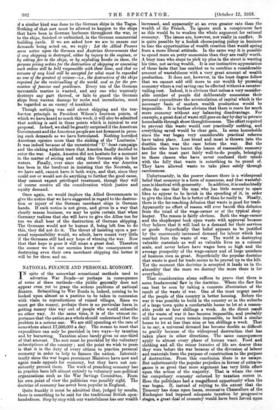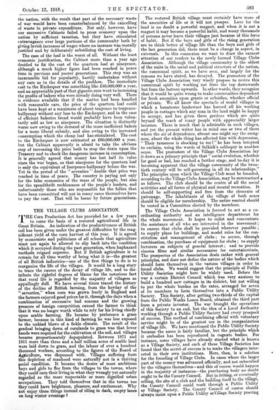NATIONAL FINANCE AND PERSONAL ECONOMY.
IN spite of the somewhat sensational methods used to advertise War Bonds—or perhaps in consequence of some of these methods—the public generally does not appear even yet to grasp the serious problems of national finance. Subscribing to War Bonds is, indeed, coming to be looked upon almost as a pastime to be taken in connexion with visits to reproductions of ruined villages, Since we must get the money, perhaps there is no particular harm in getting money this way out of people who would subscribe no other way. At the same time, it is of the utmost im- portance that the nation as a whole should understand that the problem is a serious one. We are still spending at the rate of somewhere about £7,000,000 a day. The means to meet that expenditure can only be provided in two ways—by taxation and by borrowing. Taxation alone barely gives us one-third of that amount. The rest must be provided by the voluntary subscriptions of the country ; and the point we wish to press is that it is the duty of every citizen to practise personal economy in order to help to finance the nation. Intermit- tently since the war began prominent Ministers have now and again made appeals for economy, but they have not con- sistently pressed them. The work of preaching economy has in practice been left almost entirely to voluntary non-political organizations such as the War Savings Committee. From his own point of view the politician was possibly right. The doctrine of economy has nevei been popular in England.
Quite frankly it must be admitted that, judged by results, there is something to be said for the traditional British open- handedness. Step by step with our wastefulness has our wealth increased, and apparently at an even greater rate than the wealth of the French. To ignore such a conspicuous fact as this would be to weaken the whole argument for rational economy. The issues are, however, not really in conflict. It is quite possible by a foolish cheeseparing policy in business to lose the opportunities of wealth creation that would spring from a more liberal attitude. In the same way it is possible to spend more on petty economies than they are really worth. A busy man who stops to pick up pins in the street is wasting his time, not saving wealth. It is our instinctive appreciation of these facts that has enabled us to combine a considerable amount of wastefulness with a very great amount of wealth production. It does not, however, in the least degree follow that we cannot add still more to our wealth by pursuing economy where a real saving can be effected without a counter- vailing cost. Indeed, it is obvious that unless a very consider- able number of people did deliberately economize their personal expenditure the accumulation of capital which is the necessary basis of modern wealth production would be Impossible. It is further obvious that there is room for much more economy without any balancing disadvantage. For example, a great deal of waste still goes on day by day in private households through sheer thoughtlessness. The effort required to prevent this waste would cost practically nothing, and everything saved would be clear gain. In some households since the war began very considerable practical reforms have taken place. Less bread and meat is thrown into the dustbin than was the case before the war. But the families who have learnt the lesson of reasonable economy are for the most part fairly well-to-do people, belonging to those classes who have never confused their minds with the folly that waste is something to be proud of. They have allowed waste to take place solely through carelessness.
Unfortunately, in the poorer classes there is a widespread belief that economy is a form of meanness, and that wasteful- ness is identical with generosity. In addition, it is undoubtedly often the case that the man who has little money to spare likes to appear to be lavish in the spending of it, in order to give the idea that he is better off than he really is. Finally, there is the far-reaching delusion that waste is good for trade Apparently no effort of reason will ever banish this delusion from the mind of the wage-earner or of the typical shop- keeper. The reason is fairly obvious. Both the wage-earner and the shopkeeper look upon waste with approval because they believe that it will lead to a demand for their services or goods Superficially that belief appears to be justified by the enormously increased demand for labour which has resulted from the waste of war. The world is destroying valuable materials as well as valuable lives on a colossal scale, and never before have wages been so high and the average prosperity of the wage-earner and of large numbers of business men so great. Superficially the popular doctrine that waste is good for trade seems to be proved up to the hilt. Yet the moment this doctrine is accepted it lands us in the absurdity that the more we destroy the more there is for everybody. That consideration alone suffices to prove that there is some fundamental flaw in the doctrine. Where the flaw lies can best be seen by taking a concrete illustration of the result of the waste of war. One of the most urgent needs of the people of this country is better housing. Before the war it was possible to build in the country or in the suburbs of a large town quite a comfortable house to let at a reason- able profit at four shillings a week. As the direct result of the waste of war it has become impossible, and probably will for several years remain impossible, to build a similar house to let at less than nine or ten shillings a week. That is to say, a universal demand has become double as difficult to gratify because of the widespread destruction that has taken place in other directions. The same consequences apply to almost every phase of human want. Food and clothing and all the minor luxuries of life are dearer than they were before the war because of the diversion of labour and materials from the purpose of construction to the purpose of destruction. From this conclusion there is no escape. But unfortunately the popular prejudice in favour of extrava- gance is so great that mere argument has very little effect upon the action of the majority. That is where the case for compulsory economy enforced by taxation comes in. Here the politicians had a magnificent opportunity when the war began. If, instead of relying to the extent that the Treasury has done upon loans, successive Chancellors of the Exchequer had imposed adequate taxation by progressive stages, a great deal of economy would have been forced upon the nation, with the result that part of the necessary waste of war would have been counterbalanced by the cancelling of waste in private expenditure. Not only, however, have our successive Cabinets failed to press economy upon the nation by sufficient taxation, but they have stimulated extravagance over large portions of the eommunity both by giving lavish increases of wages where no inorease was morally justified and by deliberately subsidizing the cost of living.
The cam of the loaf is the worst of all. Without the least economic justification, the Cabinet more than a year ago decided to fix the cost of the quartern loaf at nmepence, although a much higher figure had been reached in peace time in previous and poorer generations. This step was an inexcusable bid for popularity, hastily undertaken without any care as to the details of the problem. The immediate cost to the Exchequer was something like £40,000,000 a year, and an appreciable part of that gigantic sum went to increasing the profits of bakers who were already doing very well. There is evidence available that if the matter had been handled with reasonable care, the price of the quartern loaf could have been kept at a maximum of about tenpence to tenpence- halfpenny without any loss to the Exchequer, and in the case of efficient bakeries bread would probably have been volun- tarily sold as low as ninepence. The situation is distinctly worse now owing to the demand of the more inefficient bakers for a more liberal subsidy, and also owing to the increased consumption which the cheap loaf has stimulated. The cost to the Exchequer is now estimated at £60,000,000 a year, but the Cabinet apparently is afraid to take the obvious step of increasing the pribe both to stop the drain upon the Treasury and to check the dangerous increase in consumption. It is generally agreed that money has lost half its value since the war began, so that ninepenc,e for the quartern loaf is only the equivalent of fourpence-halfpenny before the war. Yet in the period of the " seventies " double that price was reached in time of peace. The country is paying not only for the false economics of the mass of the people, but also for the spendthrift recklessness of the people's leaders, and unfortunately those who are responsible for the follies that have been committed will not in many cases themselves have to pay the cost. That will be borne by future generations.



































 Previous page
Previous page